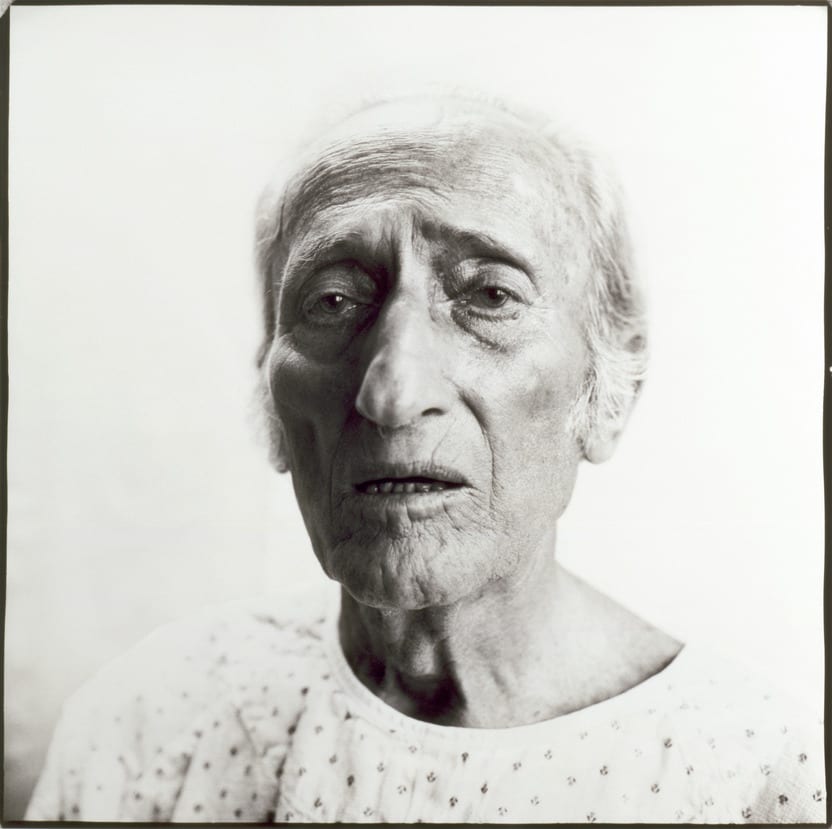
- Artist/Maker:
- Richard Avedon
- Bio:
- American, 1923-2004
- Title:
- Jacob Israel Avedon
- Date:
- 1969-73, printed 1980
- Medium:
- Gelatin silver print
- Dimensions:
- 24 × 20 in. (61 × 50.8 cm)
- Credit Line:
- Purchase: Sara and Axel Schupf, Jack and Judith Stern, and Hyman L. and Joan C. Sall Funds
- Accession Number:
- 1993-168.7
- Copyright:
- © The Richard Avedon Foundation
Not On View
Hailed early in his career as a fashion photographer extraordinaire, Richard Avedon became recognized as one of the most important portraitists of his generation. Known for his iconic images of celebrities from the worlds of art, literature, and politics, he has also directed his camera toward the downtrodden and the mentally ill and has made these anonymous figures equally commanding and empathetic. His meteoric rise in the fashion world resulted from innovative images photographed while working for Harper's Bazaar in the 1940s and 1950s-an ascent reflected in the 1957 movie Funny Face, partly inspired by his career and for which he acted as visual consultant. (The photographer in the film, played by Fred Astaire, is named Dick Avery.) However, portraits have always been Avedon's passion. His preoccupation with faces started with his assignment at age nineteen in the merchant marine, taking identification photographs of thousands of servicemen.
The artist's portfolio of seven photographs of his terminally ill father, Jacob Israel Avedon, taken from 1969 until his death in 1973, represents a stunning anomaly in his oeuvre. In this series, chronicling the deterioration of a patriarch, Avedon approaches an intensely personal subject and makes it universal. Set against a white background, the sitter reveals himself unflinchingly to the spectator's gaze. Characteristically, the artist employs no effects to soften his subject's vulnerability. He does not flatter or cajole his father, but waits for the defining moment. He uses his signature white wall, no props, no complimentary lighting, no constructed poses to distract the camera from capturing his father's raw emotions of fear, pain, and resignation. In these photographs, Avedon confronts not only his father's mortality but his own and ours.
Born in Russia in 1889, Jacob Israel Avedon endured a difficult childhood in America, including several years in a Jewish orphanage. After studying at the College of the City of New York, he taught elementary school in Hell's Kitchen. In 1917, he and a brother opened a women's retail shop on Fifth Avenue, which lasted until the Depression led to its closing in 1930. Later, he moved to Sarasota, Florida, where he began a new life as a stockbroker. His biography reads as a classic narrative of the struggles of an American Jewish immigrant.
That struggle ends with his son's study of man's inevitable frailty. When asked how he felt about taking photographs of his dying father, Richard Avedon replied that these images represent "what it is to be any one of us."
The artist's portfolio of seven photographs of his terminally ill father, Jacob Israel Avedon, taken from 1969 until his death in 1973, represents a stunning anomaly in his oeuvre. In this series, chronicling the deterioration of a patriarch, Avedon approaches an intensely personal subject and makes it universal. Set against a white background, the sitter reveals himself unflinchingly to the spectator's gaze. Characteristically, the artist employs no effects to soften his subject's vulnerability. He does not flatter or cajole his father, but waits for the defining moment. He uses his signature white wall, no props, no complimentary lighting, no constructed poses to distract the camera from capturing his father's raw emotions of fear, pain, and resignation. In these photographs, Avedon confronts not only his father's mortality but his own and ours.
Born in Russia in 1889, Jacob Israel Avedon endured a difficult childhood in America, including several years in a Jewish orphanage. After studying at the College of the City of New York, he taught elementary school in Hell's Kitchen. In 1917, he and a brother opened a women's retail shop on Fifth Avenue, which lasted until the Depression led to its closing in 1930. Later, he moved to Sarasota, Florida, where he began a new life as a stockbroker. His biography reads as a classic narrative of the struggles of an American Jewish immigrant.
That struggle ends with his son's study of man's inevitable frailty. When asked how he felt about taking photographs of his dying father, Richard Avedon replied that these images represent "what it is to be any one of us."
Information may change as a result of ongoing research.